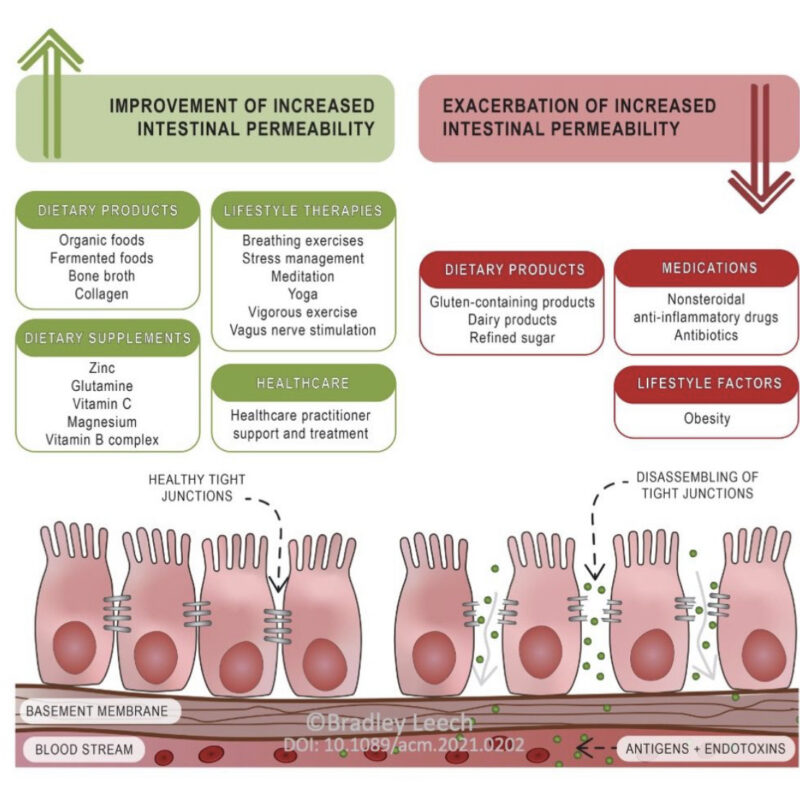
En ny studie visar att vuxna med tarmpermeabilitet (läckande tarm) mår sämre (sämre subjektivt välbefinnande) jämfört med genomsnittsbefolkningen. Detta belyser för första gången i litteraturen den kliniska konsekvensen av förändrad tarmpermeabilitet.
I studien hittade man också ett antal kostprodukter, kosttillskott, livsstilsterapier och mediciner som är förknippade med antingen förbättring eller förvärring av tarmpermeabilitet.
se bilden ovan för dessa faktorer. Dvs förbättring mha tex andningsövningar och meditation, försämring av tex värktabletter, gluten, mejeriprodukter och socker.
Mer om studien i detta filmklipp (Brad Leech):
Ur studien:
Objective: The integrity and function of the gastrointestinal system is important in disease prevention and management. This study aims to describe the management methods used by Australian adults with suspected increased intestinal permeability (IP) and the association with subjective wellbeing (SWB) and health-related quality of life (HRQoL).
Design and Setting: Cross-sectional survey of Australian adults diagnosed with IP or have suspected (undiagnosed) IP.
Outcome Measures: Questionnaire items investigating demographic characteristics, self-reported outcome of IP and treatment methods used to manage IP. Participants’ HRQoL and SWB according to the 20-Item Short Form Health Survey (SF-20) and Personal Wellbeing Index-Adult (PWI-A) scale, respectively.
Results: Participants (n = 589) frequently used dietary products (87.9%), dietary supplements (72.9%) and lifestyle therapies (54.6%) for managing IP. Participants had lower (i.e., worse) mean SWB scores for all domains compared to the Australian population (p < 0.001). The number of days IP reported to affect daily living was negatively correlated with SWB and HRQoL (p < 0.001). Participants that reported an improvement in their IP in the previous 12 months were more likely to be treated by a healthcare practitioner (OR = 2.04, p = 0.015), use dietary supplements (OR = 2.66, p = 0.003), participate in vigorous exercise (OR = 2.99, p < 0.001) and employ vagus nerve stimulation (OR = 3.10, p = 0.010). Conversely, they were less likely to consume gluten (OR = 0.35, p < 0.001) or use nonsteroidal anti-inflammatory drugs (OR = 0.35, p = 0.022). Self-reported improvement of IP (β = 10.70, p < 0.001) and use of dietary products (β = 12.12, p = 0.008) were predictors of a higher level of SWB.
Conclusions: Altered IP may pose a greater health burden than previously thought, with poor SWB and HRQoL reported in Australian adults with self-reported IP. Our results highlight the potential clinical relevance and consequence of altered IP, providing the first indication of a possible relationship between altered IP and both SWB and HRQoL.
https://pubmed.ncbi.nlm.nih.gov/34495737/
https://bradleech.com/publications/

Vi som inte förstår så mycket engelska😢
I stort sett alla västerlänningar har väl ökad tarmpermeabilitet? Med “ökad tarmpermeabilitet” menar de då en gradering, tro? Jag blir också lite osäker på vad som avses med “självrapporterad”? Hur mäter man läckande tarm?
det var väl själva välbefinnandet som var självrapporterat i huvudsak.
Läckande tarm mäts genom att man dricker en lösning med olika sockerarter / molekyler, där vissa ska komma ut i urin, andra ej. Se IPA-test: https://4health.se/mage-tarm
Skulle vara intressant att höra vilka tillskott som bidrar till läckande tarm och vilka som är goda för hälsan.
se bilden